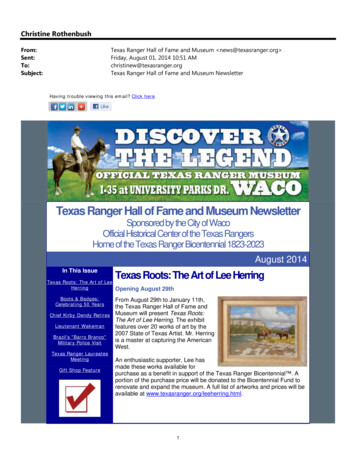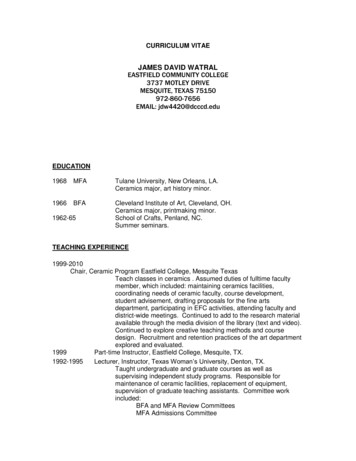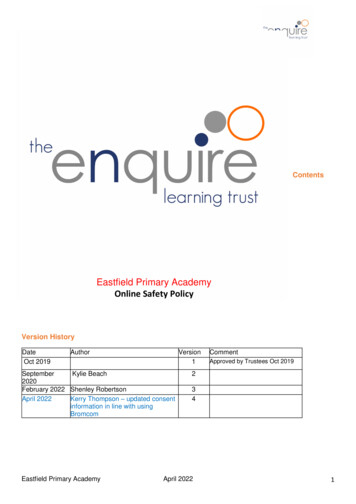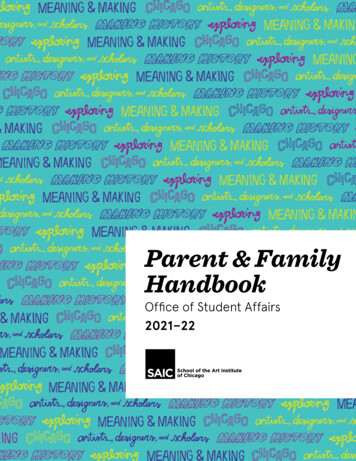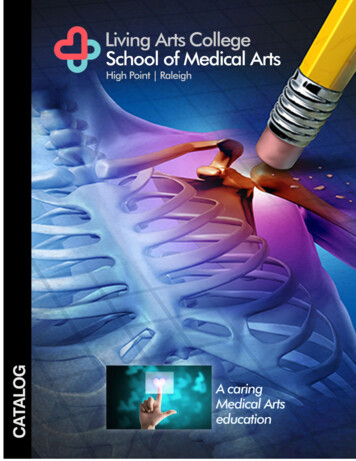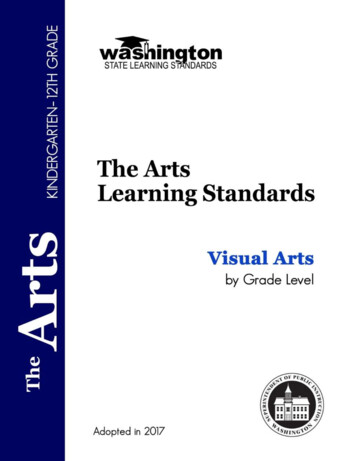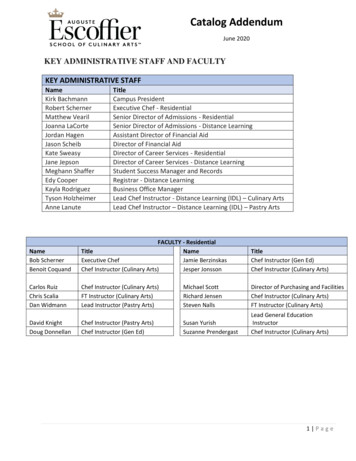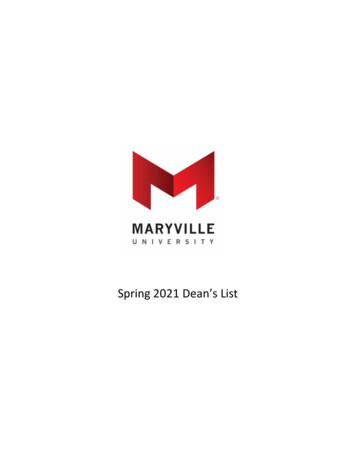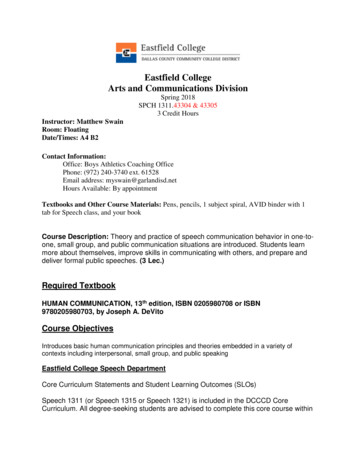
Transcription
Eastfield CollegeArts and Communications DivisionSpring 2018SPCH 1311.43304 & 433053 Credit HoursInstructor: Matthew SwainRoom: FloatingDate/Times: A4 B2Contact Information:Office: Boys Athletics Coaching OfficePhone: (972) 240-3740 ext. 61528Email address: myswain@garlandisd.netHours Available: By appointmentTextbooks and Other Course Materials: Pens, pencils, 1 subject spiral, AVID binder with 1tab for Speech class, and your bookCourse Description: Theory and practice of speech communication behavior in one-toone, small group, and public communication situations are introduced. Students learnmore about themselves, improve skills in communicating with others, and prepare anddeliver formal public speeches. (3 Lec.)Required TextbookHUMAN COMMUNICATION, 13th edition, ISBN 0205980708 or ISBN9780205980703, by Joseph A. DeVitoCourse ObjectivesIntroduces basic human communication principles and theories embedded in a variety ofcontexts including interpersonal, small group, and public speakingEastfield College Speech DepartmentCore Curriculum Statements and Student Learning Outcomes (SLOs)Speech 1311 (or Speech 1315 or Speech 1321) is included in the DCCCD CoreCurriculum. All degree-seeking students are advised to complete this core course within
the first 36 semester hours since speech stresses the needed skills for many othercourses. Students must earn a “C” or better for credit in all core courses.Core Curriculum Tier I StatementSpeech 1311 (Speech 1315 or Speech 1321) is a Tier I course in the Speaking andListening learning category. “Knowledge and skills that are important to your success inother college courses will be introduced and reinforced in Tier I. The Speaking andListening category develops your ability to communicate effectively individually, in pairsand in groups. Instructors will place an emphasis on listening, critical and reflectivethinking and responding.” DCCCD CatalogFinal Grade Reports are no longer mailed. Convenient access is available online atwww.econnect.dcccd.edu. Use your identification number when you log ontoeConnect, an online system developed by the DCCCD to provide you with timelyinformation regarding your college record. Your grades will also be printed on yourStudent Advising Report, which is available in the Admissions Office.ACADEMIC HONESTY & PLAGIARISM—Speech Departmental PolicyScholastic dishonesty is a violation of the Code of Student Conduct. Scholastic dishonestyincludes, but is not limited to, cheating on a test, plagiarism, and collusion. As a college student,you are considered a responsible adult. Your enrollment indicates acceptance of the DCCCDCode of Student Conduct published in the DCCCD Catalog c dishonesty includes, but is not limited to, cheating on tests, plagiarism andcollusion. Cheating includes copying from another student’s test or homework paper, usingmaterials not authorized, collaborating with or seeking aid from another student during atest, knowingly using, buying, selling, stealing, or soliciting the contents of anunadministered test, and substituting for another person to take a test. Plagiarism is theappropriating, buying, receiving as a gift, or obtaining by any means another’s work andthe unacknowledged submission or incorporation of it in one’s own written work. Collusionis the unauthorized collaboration with another person in preparing written work forfulfillment of course requirements.Academic dishonesty is a serious offense in college. You can be given a failing grade on anassignment or test, can be failed for the class, or you can even be suspended from college. In anywritten paper, you are guilty of the academic offense known as plagiarism if you partially orentirely copy the author’s sentences or words without quotation marks. For such an offense, astudent will receive a zero on the assignment and could even receive an F for the course. Youcannot mix the author’s words with your own or “plug” your synonyms into the author’ssentence structure. To prevent unintentional borrowing, resist the temptation to look at the sourceas you write, unless you are using a direct quote. The author’s words, phrases, sentences must beput in your words, in your way of writing. When you do this, you are demonstrating the ability ofunderstanding and comprehension.
Please be advised that academic dishonesty and plagiarism are serious issues that may result inserious consequences. Students should be aware that they are responsible for their behaviorconcerning these issues. This class will adhere to the student’s “Responsibility” as detailed in theDCCCD district-wide statement and the Eastfield College Student Code of Conduct explained inthe Eastfield College and district catalogs or on-line at the district .Consequences for Academic Dishonesty and/or Plagiarism: Any student in this Speech classfound guilty of cheating on an examination or of Plagiarism (using the definitions given for bothterms in the attached document) will receive one or more of the following penalties:o The grade of zero (0) on that particular assignment.o A course grade of F (depending on the severity of the student’s dishonesty orplagiarism).o The professor may request that the student drop the class.INSTITUTIONAL POLICY AND SERVICES:Institutional Policies relating to this course can be accessed from the following /legal/pages/policies-for-syllabi.aspxEvaluation Procedures:Speech 1311 Grade PercentagesGrades1st Grading Period2nd Grading Period3rd Grading PeriodQuizzes (30%)Ch. 1-5 QuizzesCh. 6-9 QuizzesCh. 10-13 QuizzesOutlines (20%)Visual RhetoricGroup Project PowerPointGroup Project Peer AssessmentInformative OutlinePresentations (25%)Visual Rhetoric GalleryGroup Project PresentationExams (25%)Exam 1Group Project PresentationPaperPersuasive OutlineInformative SpeechPersuasive SpeechFinal ExamAttendance Policy: Students are expected to attend all class periods; state law mandates that astudent is considered non-compliant if they miss more than 10% of class time.Course Outline:Lecture/ ActivityCourse Intro.Activity: Color ActivityActivity: Social ContractHave Read
Lecture: The Essentials of Human CommunicationQuiz: Ch. 1Journal Chapter 1Lecture: The Self and PerceptionQuiz: Ch. 2Journal Chapter 2Lecture: Visual Rhetoric AssignmentActivity: Perception CheckingLecture: Listening in Human CommunicationQuiz: Ch. 3Journal Chapter 3Lecture: Verbal MessagesQuiz: Ch. 4Journal Chapter 4Activity: Apples to ApplesLecture: Nonverbal MessagesQuiz: Ch. 5Journal Chapter 5Lecture: Culture & GenderActivity: Create your own culture!Activity: 10 Things I Hate About You!Visual Rhetoric GalleryVisual Rhetoric DueExam 1 (ch. 1-5)Lecture: Group Project AssignmentActivity: Group Meetings & PlanningGroups DueActivity: Outlining Communication, Conversation, & RelationshipsQuiz: Ch. 6Journal Chapter 6Activity: Speed DatingGroup Topics DueLecture: Managing Interpersonal ConflictQuiz: Ch. 7Journal Chapter 7Activity: Putnam & Wilson Conflict Style InventoryLecture: Small Group CommunicationLecture: Leaders & Members in Small Group CommunicationQuiz: Ch. 8Journal Chapter 8Lecture: Small Group CommunicationLecture: Leaders & Members in Small Group CommunicationQuiz: Ch. 9Journal Chapter 9Group Project Workday (In Class)Group Project Final Edits & Group MeetingsGroup Project Presentations, PPTS, & PapersLecture: Public Speaking AssignmentActivity: Topic ResearchChapter 1Chapter 2Chapter 3Chapter 4Chapter 5IChapter 6Chapter 7Chapter 8&9Chapter 8&9
Lecture: APA Introduction to CitationLecture: Public Speaking Preparation (Steps 1-6)Quiz: Ch. 10Journal Chapter 10Informative Topics DueLecture: Public Speaking Preparation (Steps 7-10)Quiz: Ch. 11Journal Chapter 11Activity: Audience Adaptation PlanLecture: Public Speaking Preparation (Steps 7-10)Activity: Sample SpeechesLecture: The Informative SpeechQuiz: Ch. 12Journal Chapter 12Activity: APA BasicsActivity: Library ResearchPersuasive Groups DueOutline Workshop Day:Outlines Due In ClassInformative PresentationsInformative PresentationsInformative PresentationsLecture: Problem/ Solution SpeakingLecture: Ethos, Pathos, & LogosActivity: Impromptu SpeechesLecture: The Persuasive SpeechQuiz: Ch. 13Journal Chapter 13Activity: Audience Adaptation PlanActivity: Library ResearchOutline Workshop Day:Outlines Due In ClassPersuasive PresentationsFinal Exam ReviewFinal Exam (10-13)Chapter 10Chapter 11Chapter 12Chapter 13Classroom Etiquette: Be respectful and treat others the way in which you desire to be treated.The instructor reserves the right to amend this syllabus as necessary
Eastfield College Arts and Communications Division Spring 2018 SPCH 1311.43304 & 43305 3 Credit Hours Instructor: Matthew Swain Room: Floating Date/Times: A4 B2 Contact Information: Office: Boys Athletics Coaching Office Phone: (972) 240-3740 ext. 61528 Email address: myswain@garlandisd.net Hours Available: By appointment
